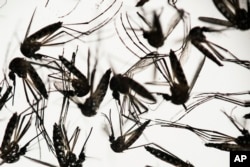A city employee skims the surface of the water. His net snags a candy wrapper, along with a dead fish. Down the shoreline, an old refrigerator floats by.
This is Guanabara Bay in Rio de Janeiro - soon to be home to the best sailors in the world as they compete in the Olympic sailing event. But the bay is so polluted, even with human feces from the city's inadequate sewage system, that health officials worry that anyone who comes in contact with its water, risks infection.
Quandaries
Brazil is in a state of turmoil on several fronts, not just the quality of water. The 2016 Olympic Games are less than three months away. Yet, the athletes don't dominate the news. A tiny insect does. Experts are warning about Zika, a virus spread by mosquitoes, that the World Health Organization has declared a global health emergency. Zika can cause mild symptoms in adults. But it is linked to the severe birth defect microcephaly, in which a baby's brain does not fully develop, resulting in a smaller head.
Zika also is spread by unprotected sexual contact. So, an Australian pharmaceutical company is supplying that country's Olympic team with condoms. The South Korean team will have long sleeve shirts and long pants treated with chemicals to repel mosquitoes. The American team will be decked out in Ralph Lauren white shorts, seemingly taunting the pesky mosquitoes with their bare legs.
Mosquito Battles
The Brazilian government is taking its own measures. More than 200,000 military personnel have been mobilized and will join the private sector and volunteers to eliminate mosquito breeding grounds. But Dr. Christopher Gaffney of the University of Zurich, appearing on VOA's Hashtag program, says that because of the country's budget crisis, police and health providers are being redirected to areas frequented by Olympic tourists, "further exposing Brazil's already very vulnerable populations to greater risk."
Gaffney, who studies urban and social impacts of sports mega-events continues, "The stresses that an Olympic game puts on all infrastructures in an Olympic city can cause them to break, sometimes quite dramatically."
Olympic officials have pointed out a lower mosquito population in August when temperatures are lower and rain less frequent during Brazil's winter when the Games will be held.
Others are calling for a delay or movement of the games to a different city, but they worry about the millions of dollars lost by corporate sponsorship. "We are weighing a cost benefit over human lives," asserts Gaffney.
Ticket sales for the Olympics in Rio de Janeiro are only at 50 percent, much less than sales for the summer London Games in 2012.
"People are afraid," says Riordan Roett, director of the Latin American Studies Program at The Johns Hopkins University School of Advanced International Studies. "Not only of Zika, but of the security issues, the gangs in Rio, the poor infrastructure and those kinds of things that tourists don't like."
WATCH: Related video clip
Political upheaval
A young Brazilian student joins other women for one of many street protests in Brazil's largest city, Sao Paolo. On Beatriz Ribeiro's right cheek is a red tattoo of the Venus female gender symbol. She is complaining about Brazil's interim president, Michel Temer. The former vice president took over for the next six months while the country's president Dilma Rousseff undergoes an impeachment trial over allegedly falsifying budget numbers. But Temer was immediately criticized after announcing an all male, all white cabinet. It was the first time no female was on the cabinet since the 1970s.
“He represents everything that is conservative," explains Ribeiro, "a government without female presence, without black women, without indigenous people, without anyone who could represent us, we don't feel represented at all." The banners around her are written in Portuguese and read, "Yes, women can!" and "Out with Temer."
Protesters in other areas of Brazil accuse the vice president of orchestrating a coup. Gabriel Ribas claims, "In 24 hours, Temer has taken us back 30 years of advances."
Temer has promised to unite the country after months of division over the president's impeachment trial. He plans to institute budget cuts to get the economy out of its recession and asks Brazilians for time. "I'm not going to be able to work miracles in two years," he said. The next presidential election is in 2018.
In a phone call Tuesday, Temer assured International Olympic Committee President Thomas Bach that the Olympic games will go forward in Rio in August without problems. What remains to be seen is whether sports fans agree with him.







